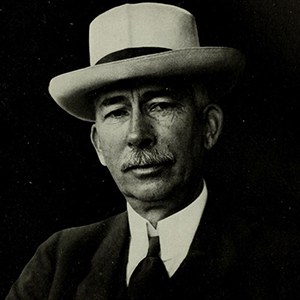Edward House was a prominent American diplomat, serving as a trusted advisor to President Woodrow Wilson. He was commonly addressed as “Colonel House,” although he had no military experience.
Early Life
House was born into an affluent Texas family in 1858. Although he never held public office himself, he was intimately involved in Democratic politics in Texas, working behind the scenes to help four governors get elected. Upon moving to New York City in 1911, House befriended New Jersey governor Woodrow Wilson and became one of his foremost advisors. After helping him win the White House in 1912, Wilson offered House his choice of cabinet positions. House declined, electing to instead to “serve wherever and whenever possible.”
WW1 & Foreign Affairs
House largely advised Wilson regarding foreign affairs, which were dominated by the outbreak of World War I. As Wilson’s unofficial representative in in Europe, House tried to maintain America’s neutrality and broker peace through diplomacy. As entry into the conflict seemed inevitable, House advocated that the United States prepare for war and later helped coordinate U.S. support for the Allies. Under Wilson’s direction, House established “the Inquiry,” a think tank of academics who devised Wilson’s famous Fourteen Points speech and the framework for the League of Nations.
End of WW1
House helped Wilson draft the Treaty of Versailles and served as Wilson’s representative at the Paris Peace Conference. However, negotiations with European leaders revealed that the two men did not always agree on policy, and it strained their relationship. As Wilson’s health declined and he tightened his inner circle, he broke all ties with House. The two did not speak for the remainder of Wilson’s presidency or prior to the President’s death.









